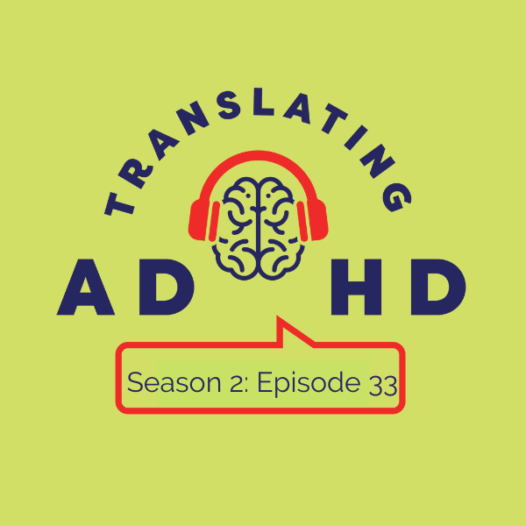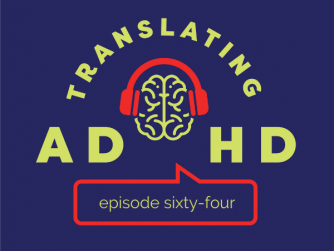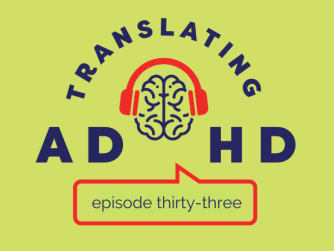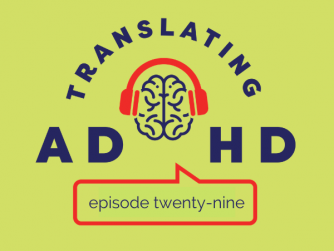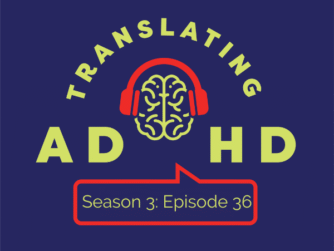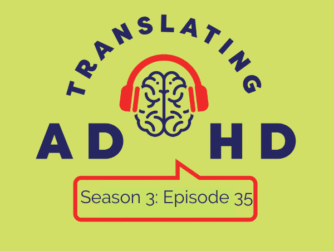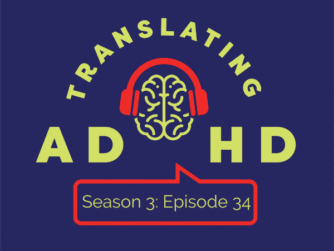In this episode of the Translating ADHD podcast, hosts Ash and Cam delve into the importance of creating optimal learning environments, especially for those with ADHD. Cam shares insights from neuroscientist Mary Helen Immordino-Yang on the role of emotion and psychological safety in learning. He reflects on his own educational experiences, emphasizing the need for relevance and connection to material.
They discuss the three barriers ADHD individuals face—awareness, action, and learning —and highlight the significance of emotional resilience, community support, and personalized learning strategies. The episode underscores the ongoing challenge of managing ADHD and the value of creating supportive, engaging environments for sustained learning and growth.
Episode links + resources:
For more of the Translating ADHD podcast:
- Episode Transcripts: visit TranslatingADHD.com and click on the episode
- Follow us on Twitter: @TranslatingADHD
- Visit the Website: TranslatingADHD.com
Episode Transcript:
[00:00:00] Ash: Hi, I’m Ash. [00:00:04] Cam: And I’m Cam. [00:00:05] Ash: And this is Translating ADHD. Cam, I’m super stoked about the topic that you are bringing today. I think this is going to be such an interesting conversation, and we didn’t talk a lot about it before we’re diving in. So I’m going to be as much along for the ride as our listeners here, which is a fun thing when we get the opportunity to do that.So why don’t you take it from here and tell our listeners what’s on your mind and where we’re going to take that today.
[00:00:34] Cam: Ash and I were talking earlier before we pushed record, just how our own experiences will inform our work. And and so I’ve probably mentioned this person on the podcast before. I know I’ve certainly talked about the role of emotion. in learning. But I was listening to a podcast interview of a neuroscientist and it’s the name is a mouthful, but I’ll get it out there.Mary Helen Immordino Yang is a neuroscientist at USC. She’s the director of a center around neuroscience and development, learning and education. And there’s four more lines, and I’m just not going to read it out loud. She’s fascinated with the role of emotion, culture, sort of social elements that contribute to learning.
I’m interested in learning because I’m a lifelong educator, right? In working with my clients, in training coaches, in being a teacher, I’m fascinated with not just helping people understand ADHD, but also how to incorporate learning and take that forward. And Ash and I have always talked about that. There are three barriers to ADHD. One is awareness, the second is action, and the third is learning.
It’s that making the learning stick. And we’ll learn stuff and then it slips away. We learn stuff and it slips away. So sometimes I’ll re-listen to podcasts just to kind of refamiliarize myself with the content. I’m listening to her, and she’s talking about when she was a teacher, how her students, they’d have to be in the right mindset in order to learn stuff.
It had a lot to do with psychological safety. It had a lot to do with context and the sense of, you know, what does this have to do with me? And I go back to being a teacher and thinking about kids who had asked me, what, why do I need this? Why do I need algebra too? And I always thought it was just this sort of like, why are you interrupting my lesson plan versus this recognition of, I need to understand my relationship to this material.
And that is so important in order for the brain to be in an optimal place to learn. Again, what does learning have to do with our work? It is instrumental in this coaching process of discovery, action, and insight. It’s a taking principles and practices and applying them over and over again.
[00:03:08] Ash: I just want to jump in with a really funny but timely example of this. My kiddo was inexplicably excited to study Watergate and the Nixon administration in social studies this year because some song that she likes samples Nixon’s famous I am not a crook speech, which caused her to seek out the entire speech, which formed this interest in this period of history.It was fascinating to me as a parent and a coach, because I can tell when my kid’s enthusiastic about something in school and when she’s not, and most of the time she’s not, and I’m not hearing a ton about school. So when something has her attention, it’s like, Ooh, what is that? And what an interesting way for her to be connected to this period of time in history. It’s just a little illustration of exactly what you’re talking about there.
[00:04:12] Cam: That’s a great example. And it takes me back to this: one of my early mentors as I was coming out of education and going into coaching, and he had an advanced degree in education and his concepts were pretty radical at the time, but it was around getting the kids into a state where they felt really good about themselves and what they were trying to do in order to then learn the material.So I was listening to this interview. And again, just how when kids are in a good place, they’re ready to learn. They’re not in a good place for whatever reason, again, the nervous system is not in a good place that then learning does not occur. And as I was walking the dog, listening to this podcast, Ash, I just went back to a teacher’s comment. It was 10th grade. It was Mrs. Imhoff. And she said, Cameron is a delightful student or delightful person. Delightful child, not a delightful student. Sorry. He’s a delightful child. And he’s a survivor and he will survive. It was her reach to sort of try to give my parents something to go on.
[00:05:27] Ash: And how did that hit you at that time? Those comments. [00:05:33] Cam: Yeah, well, it wasn’t the first time I heard stuff like that. It was sort of, again, they’re looking for something because they saw a bright kid and it was sort of inexplicable of this. You know, why is this kid struggle so much? And so they kept saying the same thing of if Cameron would only, or if Cameron would just you know, and they got tired of saying that.So here’s something else. Like I got to give him something. He’s a survivor. He’s going to survive. Here’s the interesting thing, Ash, is that the thing I really remember is when I heard that. And I’m sitting there with my mom, and I’m pretty sure I’m like 15 or 16. I said to her, I don’t want to just survive. I want to thrive.
I’m walking the dog and I’m like, had that memory. I’m like, and I’m not making that up, like that was that happened for sure. I don’t just want to survive. I really just want to, I want to thrive too.
[00:06:32] Ash: Wow. Wow. Here you and I were talking before we hit record on how much our own journeys inform our work. And that’s such a big part of coaching, isn’t it? Is getting people out of survival mode into a place where they feel like they can thrive, where they have choice and agency, where they are the captain of their own ship to a degree. And here you are at 15, 16, knowing that’s what you want, but never being told that’s accessible to you and maybe not having the right information to have it be accessible to you. [00:07:17] Cam: Exactly. And it was this, the Nike commercial of, well, just try this. I mean, we went through just, I can’t tell you the number of summers I spent with tutors and what was it called? My, my brother and I went to Cornell notes. It was something called Cornell note taking process and we went to the UMBC and we’re learning, you know, well, this is how you take notes and you break it down in the one third. And we went to it, we’re sitting there and then we decided to check out and spent two thirds of the whole thing playing lacrosse out in the field and not telling my mother. So that was it.But back to this idea of, there was a lucid moment there of this frustration. I could pull it off. I could kind of grind out Bs and Cs and do the bare minimum. And that sort of, again, at the ARC, last minute. But it was almost like there were others around me who had their ladders and their rungs.
And we’re climbing their ladders. And it was as if my ladder had no rungs or those rungs were so far apart and that I’d get on one and the next one was just out of reach here’s this desire for doing more than just surviving and not knowing the path, the toolkit, the owner’s manual.
And, Ash, the point being here is around this question was first and foremost thrust me into a state that where I was not in the best state to learn back to Immordino Yang stuff of this, there must be something wrong with me. And so again, anxiety, depression, and our clients come to us. And what we do is help them calm the nervous system so they can get into a better state brain wise. So that we can start to go down that learning path.
[00:09:25] Ash: In that metaphor, what are the rungs? Because if there were missing rungs that over time you were able to fill in, what were you filling in? [00:09:35] Cam: That’s a great question. And I think that the rungs are sort of like the stepping stones in your pool, right, in the mist. Sort of that, sort of, where are they? It’s like, it’s hard to see where those stepping stones are. [00:09:49] Ash: So listeners, if you haven’t heard this metaphor before, I’m just going to share it really quickly. This is a metaphor on journey thinking. The idea being that you are standing on a stepping stone in a foggy pond and the fog is so thick around you that you can’t see the other stepping stones available to you.And so one option is to jump into the water and just scramble blindly towards shore. The other is, and this is a way of describing coaching process, is to clear the fog a little bit so that you can see that next stepping stone. And from that next stepping stone or that next rung, There might be perspective options opportunity available to you that were not visible or perceptible to you from the previous stepping stone.
So just wanted to toss that in so that listeners who haven’t heard that metaphor before are caught up to what you mean, Cam. So it’s kind of like the stepping stone in that metaphor
[00:10:52] Cam: And I would say the biggest one is confidence. The thing that I did not have is any confidence whatsoever, because I didn’t have any confidence because I didn’t have a road map. I didn’t have a sense of how to approach this stuff that was not urgent, right? I did okay with urgent stuff, right?Listeners, we all do okay with the urgent stuff, but taking five classes at a college prep high school and managing that and learning how to write. And learning how to defend an argument and, you know, taking college level chemistry and physics it was way in over my head, number one.
And my mom threat, she was like, I’m going to send you to poly technical Institute. I really think it would have been the best thing for me. To go and learn a trade and get my hands dirty because, again, that’s how I learned going forward is I went into experiential education, right? Ropes course outdoor education and that experiential element, which has ties to coaching and became a geology major where you’re out and you’re like picking up the goddamn rocks, you know, and being able to whack them.
[00:11:59] Ash: And even today, Cam – and we were talking about this before we hit record – so much of our learning is informed every day by the work that we’re doing with our clients That our work today is experiential learning and listeners We’re bringing that learning to you each week on this show. That’s why we’ve tried and failed to give themes or give structure.The themes happen when they happen, because this show is always at its best when we’re following what has our attention, what we’ve learned recently, something that really resonated in a client session, something that shook loose our own understanding or gave us new language. To something that we’ve seen time and time again with clients, something that we feel would be relevant to bring here and talk about.
It gives us a different way to talk about it. New language to talk about it. We’re so often talking about the same things over and over again on this show, but different angles, different language, new learning. Each time we sit down and do this.
[00:13:04] Cam: Great commentary. So back to the rungs, you know, it’s a mixed bag and they, there’s no sequence. It’s like, I’m sure that there are listeners who are like, okay, just give me the list of rungs and lay them out for me. It’s like, okay, let me set this up by I was a very passive passenger in the world when I was 16.Someone would call that ambivalent. I’m ADHD inattentive, and it was like, I just go with the flow. And I had a friend group, and I would just sort of meander. I’d always be about six feet behind them looking up at the clouds. And they were just like, and they just kept me on it. It’s like, Cam, you know, let’s go.
And I just sort of follow along. I’d follow the crowd. And so started with ambivalence and then sort of, what is that emotional state? A little bit of confusion, a little bit of not knowing what I didn’t know. Right back to that first stage of learning and this pre contemplative state and the Prochaska change model is you don’t know what you don’t know.
So I was there. I didn’t know what I didn’t know. And I didn’t have any mechanism for engaging. I couldn’t find a mechanism. So that’s part of the rung of finding the mechanisms to engage with just anything. You know, to try to engage some kind of change. So that’s a process over the years of recognizing, first of all, there’s a dilemma and the dilemma is in my wiring.
If you are still playing that game of, oh, maybe I don’t have ADHD, maybe I don’t have ADHD. Maybe it’s, you know, maybe I just need to try harder. You’re just playing that game.
I just had a conversation with a client who’s trying meds, and it’s like it’s really hard for me to try meds because I feel like I’m failing. It’s like I’m somehow taking the easy way out and I’m trying these meds.
So, that was the first part, is understanding and appreciating, my brain is different. I’ve got to figure out how it’s different and what is the specific dilemma. When we do this, though, then the dilemma comes down in scale. It’s not this colossal, undifferentiated mass, Asher, of, it’s all shit.
[00:15:24] Ash: Ooh, do I remember that, that mindset? Well, in my late teens, early twenties, right? It’s all shit. [00:15:32] Cam: It’s all shit versus, oh, well, here’s the shit. It’s over here. And we start to get perspective on it and understand it’s not this moral failing. The problem though, is I still didn’t have the mechanism to engage change. And so I got angry, and I used my anger and you know all those teachers that didn’t understand how to reach me well I’m going to prove them wrong and I’m going to reach those kids.I’m going to reach those kids. Like I got chills going down my in my body right now because that was so important to me. It’s still important to me. But I was accessing this negative neural network out of rage. So I went from ambivalent to rage and internal simmering, but it was short lived, right? I burned out in seven years and still had two more years to go, actually four more years to go. So that rage served me in the short term, but didn’t build those rungs, you know, that were sustainable.
[00:16:39] Ash: This reminds me of my client talking about burning dirty coal. There was fuel there that sustained you for a time, but it was burning dirty and it had costs. [00:16:50] Cam: Big cost. Big cost. Look at my hairline. Listeners, you have to understand is that Asher has this beautiful set of beautiful hair. It’s just like, he’s like, my hair is so it’s like, I don’t know what to do with my hair. And it’s like, I just covet his hair. It’s like, it’s so good. Mine is like, it’s fading. So, all right. But I digress.So moving forward with those rungs is starting to understand the short gains of dirty coal and moving and shifting into more sustainable ways, right, of developing this skill set and practices. Right back to the rungs of confidence, shifting perspective, recognizing there’s wiring in play and developing practices and a support network, right? That is the biggest part is finding my tribe that could be so supportive of me and that would accept me as I was and I could stop trying to mask. So those are a few rungs that I’ve been climbing for the last 30 years, 40 years since I was, you know, in my teens.
[00:18:08] Ash: When I do values and needs with a new client, whether it comes out overtly as a word they’ve chosen or comes out in the context of a different word, community is always such a present thing for my clients as a need. And I’ve often wondered why that is, for how diverse values and needs otherwise really are amongst my client.What is it about this common thread? And over my years of doing this, I’m a little clearer on that. There’s elements of authenticity, not having to mask, being loved and accepted for who you are, being heard for who you are, being understood in a world that so often misunderstands you, and there’s so much value there.
Something I didn’t really expect or think about when I came out was that just my visible existence is a model for other people. And the people that I’m close to that have their own questions, they now have somebody to talk to that gets it, understands it. And that can open up so much for you when you feel like you’ve never had the right words for something, or you’ve tried to put it to and it falls on deaf ears.
You’re just not understood. To just articulate yourself to the best of your ability and be met with actual understanding, someone else who can relate to, in a powerful way, this unique lived experience that has caused so much internal strife for you over the years and caused you to feel more misunderstood in life than understood.
So yeah, that element of people around you, community, so key.
[00:20:02] Cam: This is all kind of a breaking wave right now. I’m kind of thinking about it as we’re going here. And part of it is spending the last 15 years in adult education and learning about what are the best environments for learning. And as I’m sort of setting those up, I’m entering into those best environments for learning and getting that experience myself in inviting my clients and students to find that optimal brain space for learning.I’m getting to do it myself. That’s the interesting thing about coaching is that both coach and client get value out of the engagement. It’s a partnership.
Actually, we’ll end on this. I had a a neurotypical colleague say, you know, you don’t struggle with ADHD every day, do you? Are you kidding? I just can deal better, right, and adjust. And it’s still there.
[00:21:09] Ash: And accept, right? That’s such a big piece of it too, is acceptance, self forgiveness, not letting those little moments or sometimes big moments drag you all the way down. [00:21:22] Cam: Right. Well, and we did that in Resilience class, one of our coaching classes. Part of the Resilience class, which is doing that, you know, emotional work to build emotional resilience was not sliding so far down in the valley, right? But finding those, sort of those ledges to stop and, you know, take care there to recover.So I think this is fascinating. It might be there’s more to dig in here around.
[00:21:51] Ash: Yeah. Speaking earlier of sometimes we stumble into a theme without meaning to, I certainly think that we’ve stumbled into one here. Look forward to next week and pulling on another piece of this, wherever this takes us next. [00:22:05] Cam: Yeah. So listeners, here’s the takeaway for this, I think, is that if you are in a place of dread or shame or guilt and or your brain is on fire with too much overwhelm, it’s finding space in some way to bring that nervous system down. And how do we bring it down to a place where it’s in a more of an optimal place for learning to bring on something new.So it’s like, I gotta create change. You’re not going to create long time, sustainable change when you are camping out next to that ARC signal, the Adrenaline Response Cycle, and where everything is stressful and urgent. So finding that space and carving that out to get your brain to a better mind space.
[00:22:59] Ash: Well said, Cam, and a great place for us to stop for today. So listeners, until next week, I’m Ash. [00:23:06] Cam: And I’m Cam. [00:23:06] Ash: And this was the Translating ADHD podcast. Thanks for listening.
